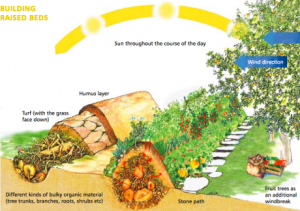I live out of town about 11 miles, a location efficiency deficit. I have some vehicle miles to account for though with careful planning and skipping work more and more and riding my bike more often I can keep those miles down somewhat. Between my wife and I we put about 20 thousand miles on our Prius and Toyota pick up and VW Golf TDI last year. One strategy we are considering is to add on to our Photovoltaic system including some batteries to cover charging an electric car. Part of this thinking is due to the possible end of the state tax credits for solar this year and the Federal credits next year. The fringe benefit is that we can use the batteries as back up during power outages. For the last 5 years we have produced a little more electricity from our solar system than we use so we already have a little surplus.
Living in the country has its advantages too. Land and solar access are generally easier to come by. We use about 1/4 of an acre for food gardening. We grow organically which reduces the carbon input costs and can actually be a carbon sink with enough care and composting. No petroleum based fertilizers or chemical pesticides; no trucking to the market, no packaging and the food waste is composted and returned to the soil for the next years crops. All this leads to great fresh food and less CO2 emissions. An average saving of 2 pounds of CO2 for every pound of food you grow. https://bit.ly/1UUohnD
We have started using some inoculated biochar in our gardens, which adds to the carbon sequestered as well as being a organic soil amendment that benefits plants. “This 2,000 year-old practice converts agricultural waste into a soil enhancer that can hold carbon, boost food security, and increase soil biodiversity, and discourage deforestation. The process creates a fine-grained, highly porous charcoal that helps soils retain nutrients and water.” https://bit.ly/18L0eE3 Biochar is available locally at several local Garden supply stores https://bit.ly/1SjgmfB (Youtube via Living Web Farms of Mills River https://bit.ly/1eWdgBm as well as many more how to videos )

Another method of storing extra carbon while improving garden soil is hugelkultur which is a way of making no dig raised beds using wood scraps buried in the base of the pile. https://bit.ly/1qWrtQn
I find growing food a great therapy as well. Somehow being involved in the complete cycle of propagating, nurturing, harvesting, eating and composting the food we eat is engaging and satisfying in a way little else is. And it saves some money- “ A home garden can yield between $1000 and $1700 worth of fresh produce for every $100 invested. “ https://bit.ly/1UUohnD
boone guyton

